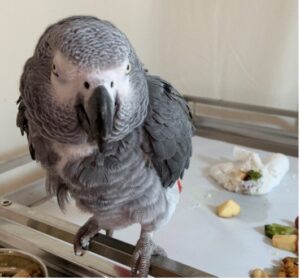
The recent storms here in New England have not been the most serious we’ve ever experienced, but they certainly remind us of the need to have emergency backup plans…something that EVERYONE should have—not only for themselves, but for their companion animals! At my home, I have a backup generator for electricity, which worked perfectly when my power went out last Saturday (thankfully for only an hour). Too, I have multiple space heaters that also worked perfectly while I waited for my contractor to appear to take care of the failure of my heating system this morning. I’m extremely lucky to have terrific neighbors who can help out if necessary. However, the welfare of my parrots is my greatest concern.
When we were at various universities, our options were somewhat simple. Our parrots were usually in facilities that had backup generators. The lab managers always had electronic alerts, so that they could respond appropriately—mostly by calling the building managers to find out when things would get back to normal, or possibly to “sound the alarm” themselves, or, in a worst-case scenario, get to the lab to deal with the issues.
I or some students lived close enough nearby that if a short-term evacuation was necessary, we could deal with whatever happened fairly easily. Even when the universities were technically shut down for various weather events, there were always on-campus students who could hike to the lab quickly to make sure the birds had care. [The COVID evacuation was clearly different, and I won’t go into the horrible mess that was…let’s just say that thanks to a bunch of folks who really, really cared, we survived very nicely!]
Now that the parrots are in an apartment, life is a bit more complicated. The alerts for the lab managers are even more critical, as we learned last week. Our senior lab manager was awoken at about 5 a.m., with an alarm alerting them to dropping temperatures. They headed directly into the lab, to find that what seemed to be the WHOLE building (about 30 apartments) was without power and, thus, without heat. Further investigation showed that, out of the ENTIRE space, the ONE room that still had electricity was that in which Griffin and Athena resided! Even the rest of our apartment was not spared.
We couldn’t believe our amazing luck, and promptly set up bird-safe space heaters. We also made sure that someone was always overseeing the equipment through the 12 hours it took to restore power and heat. We were able to keep the temperature to within about 2 degrees of optimal. But that made us really aware of the need for multiple backup plans. As you will see, multiple was and is the critical word! What if we hadn’t been so lucky?
Plan 1

Our first plan, of course, was the one we were able to use: Stay in place and deal with the problem. Note that we have an insulated backpack (see image) that could also have kept the birds warm for a while. Also, the birds are trained to get into that backpack quickly and without a fuss, just in case time is of the essence.
But we also had other plans, assuming that we needed to evacuate. Our evacuation Plan 1 is to bring the birds to the home of the RA who lives nearby and who housed them during COVID. But she and her husband are on sabbatical this year in NYC.
Plan 2
On to Plan 2: To bring the birds to the apartment of another local research associate. But she is in the U.K. for several months (although we were able to contact her easily, and she would have quickly arranged access to her apartment had it proved necessary). Other folks either live too far away or have housing conditions (too many roommates, pets, etc.) that would have made it impossible to move the birds there.
Plan 3
We realize that we now needed a Plan 3: So, we are trying to find nearby and not-so-nearby hotels that would allow birds (not as easy as you might imagine—“pet-friendly” hotels understand dogs and cats, but often balk when you talk about a bird—and a local spot might also be lacking power).
When you read the news—hurricanes and floods, tornados, wildfires, record-breaking hot and cold temperatures, for example—being a wee bit scared and very proactive is clearly the way to live. A twist on the financial saying “past performance is no guarantee of future results” would seem to be something to take to heart with respect to conditions that require planning for the safety of ourselves and our companion animals.

6 Comments